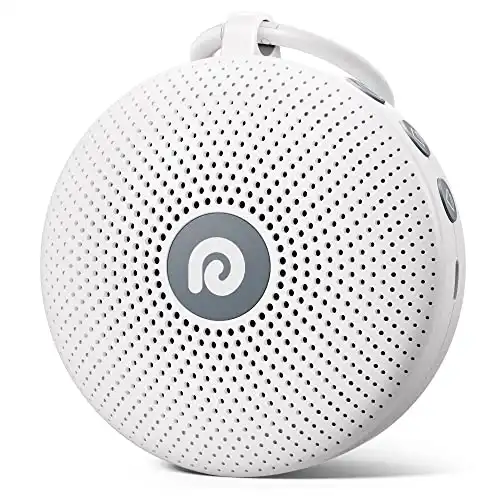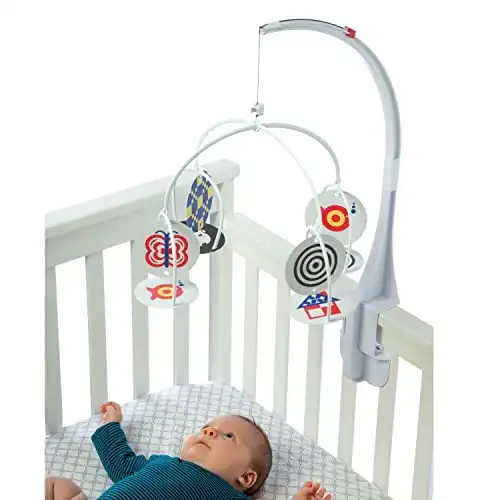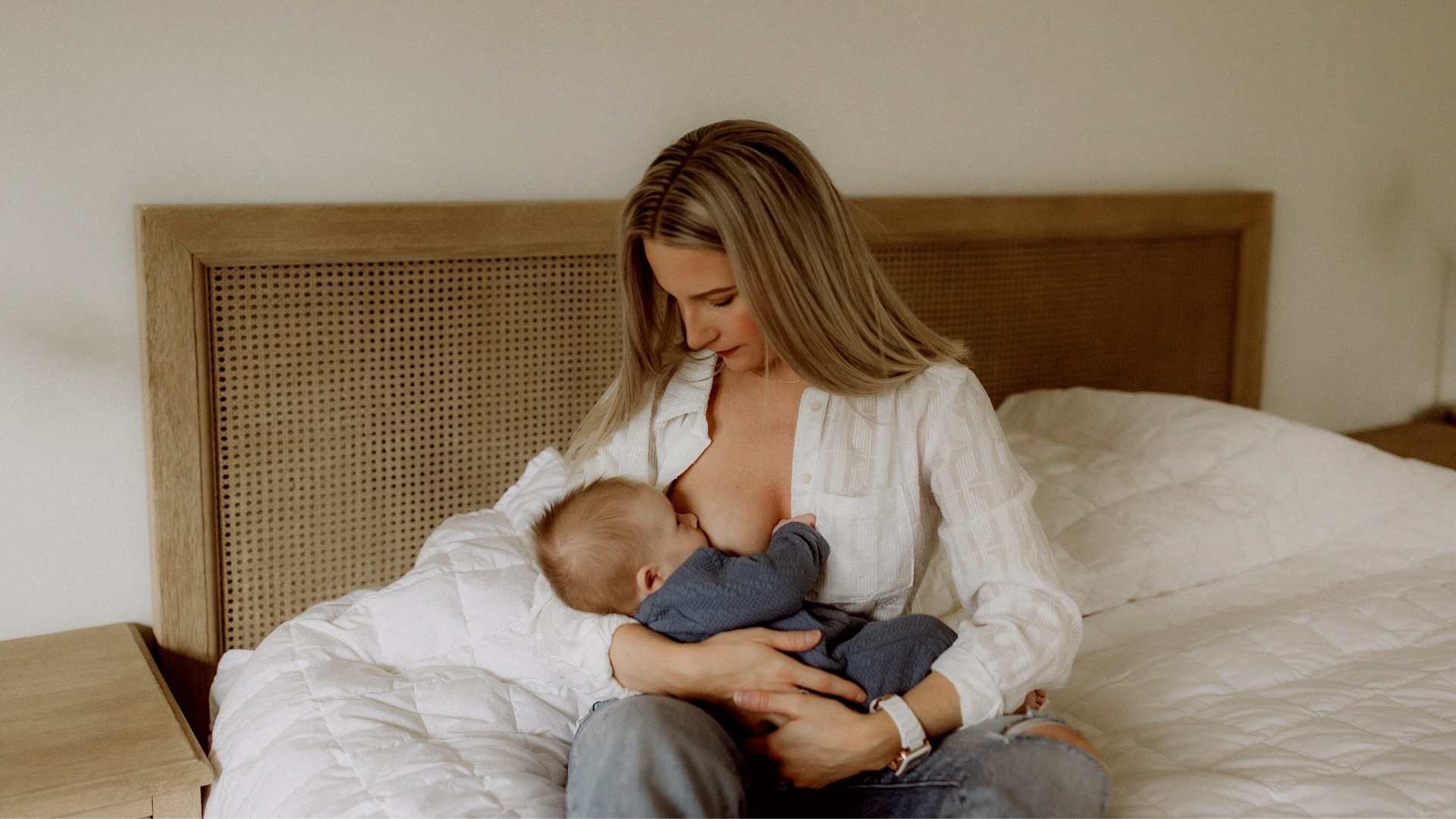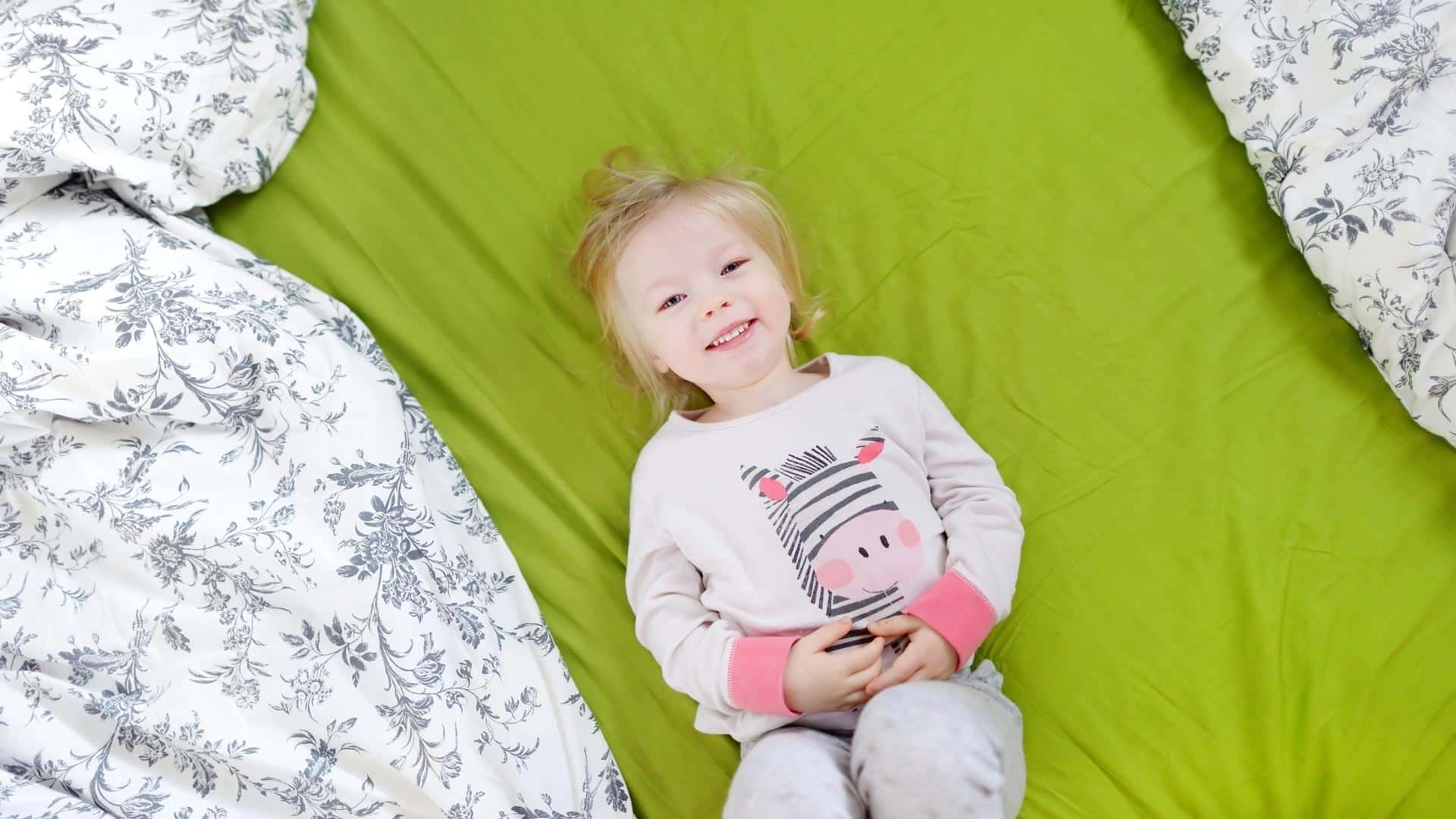So your baby won’t sleep in crib? It’s a common issue that many parents face. But rest assured, there are solutions to help your baby or newborn sleep soundly in their crib starting tonight.
Why Baby Won’t Sleep In Crib
Moving your baby from the bassinet to a crib is a big step. Some babies take to it beautifully while others will struggle. If your baby won’t sleep in a crib, it can be very frustrating and exhausting for you and for them. There are several reasons why your baby may resist sleeping in their crib and therefore things you can do to fix it.
Some of the most common reasons why your little one may not be happy sleeping in their crib are:
1. Unhelpful Sleep Associations
One of the most common reasons why your baby won’t sleep in cribs is that they have developed sleep associations with other places or objects.
For example, if you have been rocking your baby to sleep in your arms or nursing them to sleep in your bed, they may have become accustomed to falling asleep in those positions.
Often when we move our babies to a crib we assume that they are old enough to fall asleep without being fed to sleep or rocked…. However, most babies will need to be weaned off these sleep associations before they can fall asleep alone.
As a result, when you try to put them down in their crib, they are very likely to resist because it is unfamiliar to them.
2. Separation Anxiety
Another reason why your baby may resist sleeping in their crib is separation anxiety. This is a normal part of development and usually starts around 6 months of age so often coincides with being moved from a bassinet to a crib.
Your baby may become anxious and upset when you leave the room or put them down because they want to be close to you.
3. Overstimulation
As your baby grows and they become more aware of the world around them they no longer spend most of their time sleeping or eating.
They are learning new skills all the time and this can mean that they become easily overstimulated which in turn can lead to overtiredness.
If your baby is overtired or overstimulated, they may have difficulty settling down and falling asleep when you put them down in their crib.
4. Discomfort Or Illness
Finally, your baby may resist sleeping in the crib if they are uncomfortable or ill.
For example, if they have a stuffy nose or are teething, they may have difficulty breathing or be in pain, which can make it difficult for them to fall asleep.
Additionally, if their crib is too hot or cold, or if they are wearing uncomfortable clothing, they may resist sleeping in the crib.

Tips To Get Baby To Sleep In Their Crib
So if your baby won’t sleep in cribs… what can we do to help them?
1. Follow Safe Sleep Recommendations
First and most importantly ensure your baby’s safety, always follow safe sleep recommendations.
Place your baby on their back to sleep, use a flat and firm mattress, and keep soft objects and loose bedding out of the crib.
REMEMBER: Don’t be tempted to put soft toys in the crib or use bumpers to “make it more cosy’ for your baby. This will simply increase the chance of SIDS (sudden infant death syndrome), which is a risk you do not want to be taking.
2. Create A Comfortable Sleep Environment
Make sure your baby’s sleep space is comfortable. Keep the room cool and use a fan for air circulation when the weather is warm. Dress your baby in comfortable clothing by using a sleep sack instead of blankets.
Using a white noise machine can also help settle your baby to sleep by keeping ambient noise to a minimum and providing soothing sounds.
White noise machines are a game-changer for your little one's sleep and having one that plays all night is a must. With a long-lasting battery, this compact and stylish white noise machine contains 21 non-stop relaxing noises, which will lull your little one to sleep night after night, no matter where you are!
3. Establish A Consistent Bedtime Routine
If your baby won’t sleep in a crib, check their daily and evening routines.
The cornerstone of getting your little one to settle to sleep is a consistent bedtime routine to help your baby feel calm and relaxed. Read a book, sing a lullaby, or give a gentle massage to help your baby wind down.
4. Allow Baby To Lie Awake In Crib During Day
It’s okay for your baby to spend some time awake in their crib. This can help them learn to self-soothe and fall asleep on their own.
Put your baby in their crib while they are awake for a few minutes during the day, for instance when you need to visit the bathroom. Put up a crib mobile for them to watch and relax under. All of these things will help them get used to spending time in their crib while awake.
This award-winning crib mobile from the trusted Manhattan Toys range is perfect for entertaining your newborns without being overwhelming. It has 10 interchangeable cards that offer a range of simple high-contrast images to more complex coloured patterns and graphics to boost your little one's visual development!
5. Don’t Rush In
Avoid picking up your baby immediately when they wake up and instead give them some time to settle themselves. Many babies will fuss for a short while when put down to sleep or when they wake in the night but if they’re left for a short while they may re-settle themselves.
Of course, if they become very distressed you should go and comfort them.
6. Encourage Self-Settling
Encourage your baby to learn how to self-settle by putting them down drowsy but awake. This can help them learn to fall asleep on their own without needing to be rocked or held.
Developing strong sleep associations through consistent evening routines will also help baby learn to self-settle.
7. Make A Difference Between Nighttime And Daytime Interactions
Help your baby learn the difference between nighttime and daytime by keeping interactions during nighttime feedings and diaper changes quiet, dark and minimal.
During the day, talk and play with your baby to encourage wakefulness.
8. Try Sleep Training Methods
If your baby won’t sleep in cribs, despite trying everything, consider trying sleep training methods. For young babies, I would use the gradual retreat method to get them used to falling asleep without you.
However, always consult with your paediatrician before trying any sleep training methods.
TOP TIP: If, despite all your efforts your little one is still struggling to settle in their crib take a look at this post: Why Do Babies Fight Sleep for more tips and suggestions on how to help your baby fall asleep peacefully.
Looking to get your little one to sleep quickly and effortlessly through a healthy nighttime routine? Check out my Bedtime and Nap Cheat Sheet and master the art of making daytime naps and bedtimes as seamless as possible.
A bedtime & nap cheat sheet so good your little one will ask you to put them to bed...
Laura Williams "This is a life saver! I'm so glad I downloaded your bedtime & nap cheat sheet. My little one actually asked me to put him to bed last night! Unbelievable! Thank you so much!"
Click Here For The FREE Cheat Sheet
When To Seek Professional Help
If your baby won’t sleep in their crib despite your best efforts, it can be frustrating and exhausting.
While some babies may take longer to adjust to sleeping in a crib, there may be underlying issues that require professional help.
Here are some signs that it may be time to seek help from a healthcare provider:
- Your baby consistently refuses to sleep in their crib and is waking up frequently at night.
- Your baby is experiencing symptoms such as fever, coughing, or difficulty breathing.
- Your baby is not gaining weight or is losing weight.
- Your baby has a medical condition that affects their sleep, such as reflux or sleep apnea.
- You are experiencing symptoms of postpartum depression or anxiety that are impacting your ability to care for your baby.
If you are concerned about your baby’s sleep habits or overall health, it’s important to seek help from a healthcare provider.
They can evaluate your baby’s sleep patterns and provide guidance on how to improve them.
They can also rule out any underlying medical conditions that may be impacting your baby’s sleep.
Remember, seeking professional help is NOT a sign of weakness or failure as a parent. It’s a proactive step towards ensuring your baby’s health and well-being, as well as your own.
Frequently Asked Questions About Why Baby Won’t Sleep In Crib
Looking for more information about why your baby won’t sleep in crib and what you can do about it? Here are the answers to the most common questions.
How Do I Get My Baby To Sleep Without Being Held?
One way to get your baby to sleep without being held is to establish a consistent bedtime routine to ensure they are primed for sleep. This can include a warm bath, a massage, a story, and a lullaby. You can also try swaddling your baby or using a white noise machine to create a calming environment.
PS: A weighted swaddle can help to make your baby feel safe and secure as they fall asleep.
With soft, plush micro-fleece, this super soft swaddle wraps newborns in just the right amount of warmth. This sleep sack swaddle suits infants from birth to potentially 3 months, offering both comfort and safe sleep practices with its arm immobilization feature.
The innovative 3-way swaddling system adapts to a baby's sleep style, a crucial feature for those restless nights. Whether it's arms in, hands-to-face, or arms out, it grows with the baby's swaddling needs!
Meanwhile, the bottom zipper makes midnight diaper changes a breeze!
How To Get Your Baby To Sleep In Crib After Co-Sleeping?
Transitioning your baby from co-sleeping to sleeping in a crib can be challenging, but it is possible.
Start by placing the crib in your room for a few nights, so your baby can get used to the new sleeping arrangement. You can also try placing a shirt or blanket with your scent in the crib to provide comfort.
You will then have to follow the tips outlined in my How To Teach Baby To Self-Soothe post to ensure baby falls into a healthy independent sleep routine.
How Do I Get My Baby To Sleep In His Crib Without Crying It Out?
I am NOT an advocate of letting young babies cry it out except in extreme circumstances when nothing else has worked. I prefer the gradual retreat method which is kinder to your little one and less stressful for you.
You can also try gently patting or rubbing your baby’s back until they fall asleep rather than rocking or holding them.
Baby Won’t Sleep In Bassinet, What Can I Do?
Swaddling your baby or using a white noise machine to create a calming environment is a perfect way to help your baby settle in their bassinet.
If they have previously been happy in their bassinet, consider transitioning your baby to a crib. Take a look at my post on when to move your baby from a bassinet and how best to manage the transition.
Further Reading
If you would like to learn more about handling sleep issues such as sleep regressions, sleep schedules and safe sleep practices, read these posts:
- Sleep Regression: What, Why, Signs & Sanity-Saving Solutions
- 6 Month Old Sleep Schedule
- 8 Month Old Sleep Schedule
- 10 Month Old Sleep Schedule
- 12 Month Old Sleep Schedule
- 18 Month Old Sleep Schedule
- Why Do Babies Cry In Their Sleep? End Nighttime Crying Now.
- Wake Windows By Age: Optimal Sleep For Babies And Children
- 2 To 1 Nap Transition: How To Make The Switch Successfully
- The Best Baby Bassinet Of 2023: Stylish, Portable And Safe
- When To Move Baby To A Crib
- Baby Waking Too Early?
[help
sleep cycles, medical advice, flat surface, crib mattress, crib at night, awake time, months of life, baby awake, baby monitor, newborn baby, deep sleep, sleep difficulties, sleep experts

A bedtime & nap cheat sheet so good your little one will ask you to put them to bed...
Laura Williams "This is a life saver! I'm so glad I downloaded your bedtime & nap cheat sheet. My little one actually asked me to put him to bed last night! Unbelievable! Thank you so much!"
Click Here For The FREE Cheat Sheet





